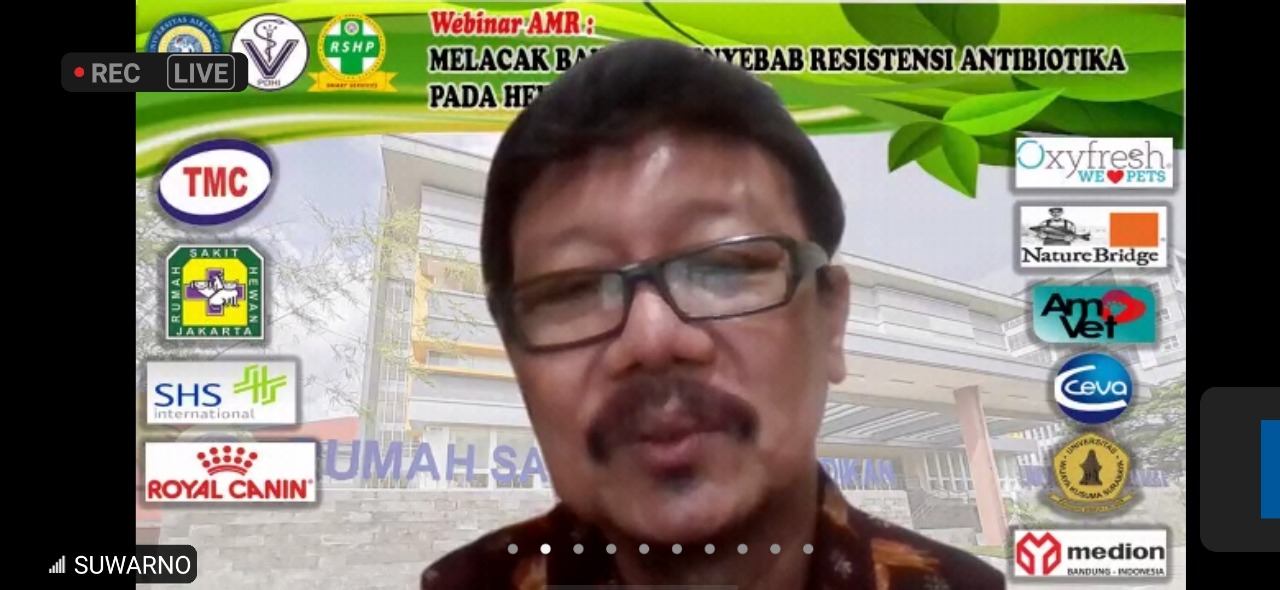UNAIR NEWS – Antimicrobials, more commonly known as antibiotics, are substances or components often used to treat microbial infections in humans and animals. Antibiotics are chemicals produced by organisms such as bacteria, which can interfere with other microorganisms. They can kill bacteria (bactericidal) or inhibit the growth of bacteria (bacteriostatic) or other microorganisms. Some antibiotics are active against several species of bacteria (broad-spectrum), while others are more specific against certain bacterial species (narrow spectrum).
Antimicrobial Resistance (AMR) has become a global problem throughout the world. AMR has an impact on public health, the emergence of multidrug resistance, the emergence of antibiotic residues, and the difficulty of treatment in humans and animals.
Prof. Suwarno, Professor of the Faculty of Veterinary Medicine (FKH) Universitas Airlangga (UNAIR), gave his statements in a webinar held by the UNAIR Veterinary Teaching Hospital (RSHP) in collaboration with the Veterinary Association (PDHI) East Java 1 on October 2, 2021. According to him, the problem of AMR in the world is mainly due to the increasing number of antibiotic resistance cases in animals and humans and the slow discovery of new antibiotic types.
Pets, he continued, are assumed to be reservoirs of AMR to humans because of the frequent use of broad-spectrum antibiotics and the close relationship between pets and humans.
“The main contributor is the food chain,” said Prof. Suwarno.
Furthermore, Prof. Suwarno explained that bacterial resistance results from the prolonged provision of antibiotics in the feed. In addition, he added, excessive provision of antibiotics or noncompliance with the doctor’s prescription is also one of the contributing factors.
“The provision of raw feed in the form of meat, chicken, and fish and lack of animal hygiene are also contributing factors,” said Prof. Suwarno.
Prof. Suwarno in his presentation also explained that the main problem of AMR in Indonesia occurs because clinical cases of AMR are almost unrecorded and not monitored. Moreover, data related to AMR in pets is still very minimal.
“Resistant bacteria that have been reported in Indonesia include Staphylococcus aureus, Pseudomonas aeruginosa, Escherichia coli, and Klebsiella pneumoniae,” said Prof. Suwarno.
Meanwhile, the types of antibiotics, he said, are penicillin, tetracycline, streptomycin, aminoglycosides (gentamicin), and quinolones (enrofloxacin).
“Antibiotic resistance genes such as mecA from Methicillin-resistant Staphylococcus aureus will reduce the ability of drugs to bind or completely inhibit drug binding by changing the structure of the penicillin-binding protein,” explained Prof. Suwarno.
Prof. Suwarno urged pet owners and all of us to use antibiotics only to treat bacterial diseases. Then, he said, antibiotic use must be based on the diagnosis accuracy prescribed by a veterinarian.
“Increasing public awareness and understanding of the importance of personal and pet hygiene, not giving raw food to pets, and not throwing antibiotics in any place are the best solutions to prevent AMR, especially in pets,” he concluded. (*).
Author: Muhammad Suryadiningrat
Editor: Nuri Hermawan





